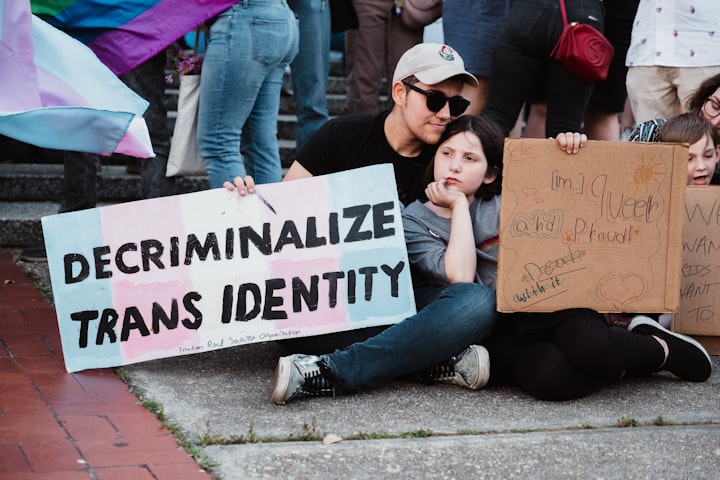The Topic of Gender-Affirming Care
And the Logical Fallacies used to argue against it.

Logical fallacies often tap into emotions to sway opinions. Fear-based fallacies, like the appeal to fear or the slippery slope fallacy, can create a sense of urgency or alarm by suggesting dire consequences if a particular action or viewpoint is not adopted. For example, in the context of gender-affirming care, an argument might falsely suggest that allowing such care for transgender youth will lead to irreversible harm or societal chaos, appealing to parental fears for their children's well-being.
Speakers knowingly using these fallacies can erode their credibility or Ethos without the audience realizing it. This happens because the audience might sense manipulation or realize the lack of substantial, reasoned arguments. Over time, repeated use of fallacious reasoning can damage the speaker's trust and credibility with their audience.
Speakers might also unintentionally fall into these fallacies, especially in emotionally charged topics. For instance, someone arguing against gender-affirming care might genuinely believe that allowing such care to minors would lead to adverse outcomes, relying on personal beliefs or anecdotal evidence without considering a broader, evidence-based perspective.
Deliberate use of these fallacies as manipulative tools involves exploiting emotional responses to strengthen an argument without providing solid reasoning or evidence. This manipulation clouds logical thinking, making it harder for the audience to evaluate the argument's validity critically. This tactic might divert attention from weak points or create a sense of urgency that overrides careful consideration.
Understanding these dynamics helps audiences become more aware of emotional manipulation. It encourages a focus on evaluating arguments based on logic, evidence, and reasoned analysis rather than solely on emotional appeal. It also underscores the importance of critical thinking in assessing the validity of arguments presented in debates or persuasive communication.
Some of the most common ones that I have come across in dealing with people who wish to argue over gender-affirming care are:
The Straw Man: This occurs when someone misrepresents or oversimplifies an opponent's argument to make it easier to attack or refute. Instead of addressing the argument, the person attacks a distorted or exaggerated version.
In discussions against gender-affirming care, a straw man fallacy might be employed by misrepresenting the goals or effects of such care. For instance, an opponent of gender-affirming care might present it as solely about encouraging irreversible medical procedures for children without acknowledging the comprehensive and multidisciplinary approach it typically involves.
By misrepresenting this comprehensive approach as solely about hasty, irreversible medical interventions, those arguing against gender-affirming care create an exaggerated or oversimplified version of the actual practice—making it easier to attack or dismiss. This fallacy diverts attention from the nuanced and evidence-based nature of gender-affirming care, potentially undermining its legitimacy and importance in supporting transgender individuals' health and well-being.
Hasty Generalization: This occurs when a conclusion is drawn from insufficient evidence or a small sample size, making a broad generalization that is not supported by adequate data.
For instance, an opponent of gender-affirming care might highlight a specific case where an individual expressed regret after undergoing a gender-affirming procedure. They might then generalize this instance to claim that all individuals pursuing such care will inevitably experience regret or adverse outcomes.
This argument would be a hasty generalization because it extrapolates from a limited or isolated example to make a broader claim about the effectiveness or outcomes of gender-affirming care for all individuals. It overlooks the diversity of experiences within the transgender community, and fails to consider the overwhelming evidence supporting the positive impact of gender-affirming care for many individuals in alleviating gender dysphoria and improving mental health outcomes.
Appeal to Traditions: This fallacy assumes that something is better or correct simply because it has been done or believed for a long time, ignoring the possibility of change or improvement.
Opponents of gender-affirming care might argue that traditional, binary views of gender have been upheld for centuries and have served society adequately. They might claim that deviating from these traditional norms by supporting gender diversity or providing medical care for transgender individuals contradicts long-standing cultural or religious beliefs about gender roles and identity.
This argument relies on the assumption that because certain gender norms or medical practices have been historically prevalent, they are inherently superior or should be unquestionably maintained. It suggests that modern understandings of gender identity, which acknowledge a spectrum of gender expressions and support gender-affirming care, are invalid simply because they diverge from traditional beliefs or practices.
However, appealing to tradition in this way overlooks societal evolution, changes in understanding human rights, and advancements in healthcare. It dismisses the growing body of research and empirical evidence supporting the efficacy and importance of gender-affirming care in promoting the well-being of transgender individuals.
Understanding and identifying logical fallacies that manipulate emotions is crucial in fostering accurate assessments based on evidence. By comprehending these fallacies, we empower ourselves to counter their emotional sway and encourage a more reasoned evaluation.
Moreover, acknowledging the nuanced and evidence-backed nature of gender-affirming care is paramount. Supporting this care aligns with enhancing the well-being of transgender individuals and cultivating an inclusive society. It requires recognizing the intricate nature of gender identity, respecting each person's journey, and advocating for their dignity and rights. Through education, advocacy, and fostering support, we strive toward a more accepting world that embraces diverse identities and fosters a culture of respect and understanding.
About the Creator
K.M. Dallas
I'm a 40-year-old polyamorous, Dominant, trans man (he/him), and Satanist. I'm also a fiction writer with a very spicy mind thanks to ADHD & Autism. I take on romance/erotica commissions when time allows & ghostwrite professionally.






Comments (1)
Hey! I'm going to feature this in the Queer Vocal Voices FB group today. Really well written and informative.